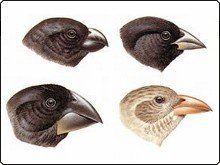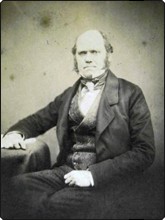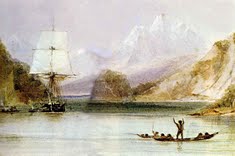
Darwin Discovers Natural Selection in the Galapagos
Much can be read into the full title of Charles Darwin's great work, which is 'On the Origin of Species by Means of Natural Selection or the Preservation of Favoured Races in the Struggle for Life'. It is effectively one long argument in support of his theory as to how and why species come about, resulting a huge leap in our understanding of the natural world and our role in it.
The Galapagos Islands are inextricably linked to Charles Darwin. If you go on a Galapagos liveaboard you will learn a great deal about Darwin's studies here. There is a Charles Darwin research centre in Santa Cruz and his musings on tortoises, finches, marine iguanas and more are quoted everywhere. Had he been trained in scuba, he would undoubtedly have marvelled just as much at the amazing abundance and variety of sea-life that can be witnessed when diving Galapagos!
 Undoubtedly his travels contributed greatly to his work, but it is easy to overstate the role played by 'The Voyage of the Beagle'. While this may have been instrumental in broadening Darwin's mind and ways of thinking, there was no 'Eureka' moment as he stood on the rocky shores of the Galapagos Islands. We may love the thought of the young Darwin staring at some finch samples on board the Beagle and banging his desk with glee as everything fell into place in his mind.
Undoubtedly his travels contributed greatly to his work, but it is easy to overstate the role played by 'The Voyage of the Beagle'. While this may have been instrumental in broadening Darwin's mind and ways of thinking, there was no 'Eureka' moment as he stood on the rocky shores of the Galapagos Islands. We may love the thought of the young Darwin staring at some finch samples on board the Beagle and banging his desk with glee as everything fell into place in his mind.
However the truth is that it took Darwin many more years, deeper study and less glamorous scientific endeavour for his great work to become crystallised into the contents of 'On the Origin of Species'. A humble chalk bank in Kent, England near his home played a role as vital, if not considerably more so, than any of the stops on his exciting voyage on HMS Beagle.
"It is interesting to contemplate an entangled bank, gloved with many plants of many kinds, with birds singing on the bushes, with various insects flitting about, and with worms crawling through the damp earth, and to reflect that these elaborately constructed forms, so different from each other and dependent on each other in so complex a manner, have all been produced by laws acting around us."
In so writing he was unleashing a new view of nature. One is of which man was not made "in the image and likeness of God", but was simply part of the great tree of life. A father of 10 children, 7 of whom survived to adulthood, Darwin saw his human family as part of the mammal family and as an intrinsic part of the living world, and not apart from it. This conclusion was only arrived at following years of painstaking study and inner conflict, and was kept in a private notebook not to be shared with the wider world until the publication of his great work.







 The second voyage of HMS Beagle, from 27 December 1831 to 2 October 1836, was the second survey expedition of HMS Beagle, under captain Robert FitzRoy who had taken over command of the ship on its first voyage after her previous captain committed suicide. FitzRoy...
The second voyage of HMS Beagle, from 27 December 1831 to 2 October 1836, was the second survey expedition of HMS Beagle, under captain Robert FitzRoy who had taken over command of the ship on its first voyage after her previous captain committed suicide. FitzRoy...